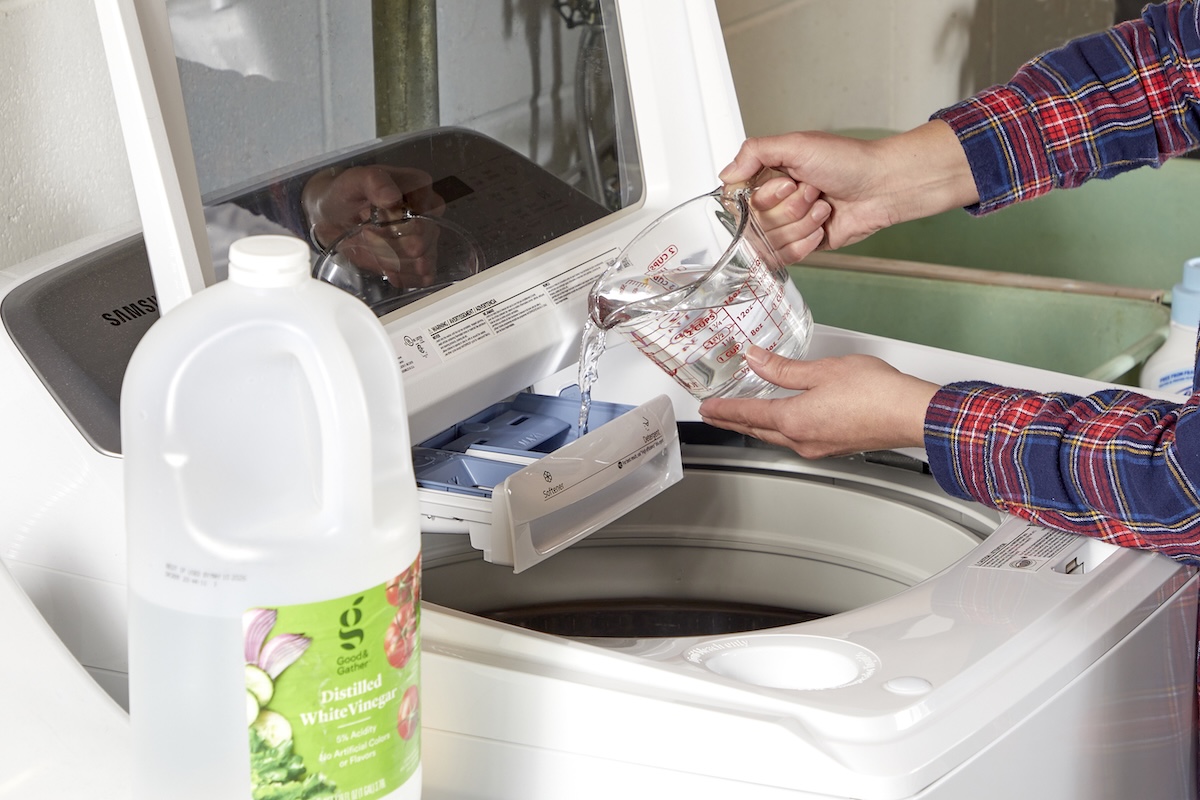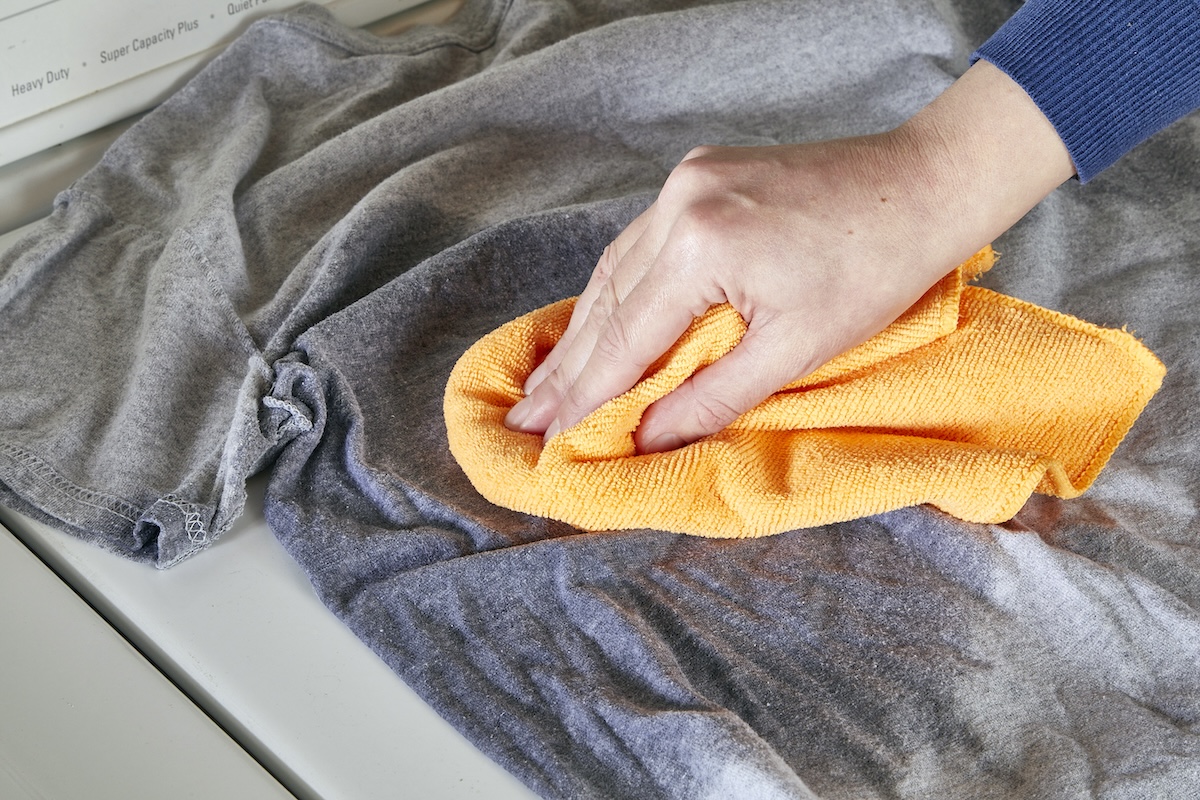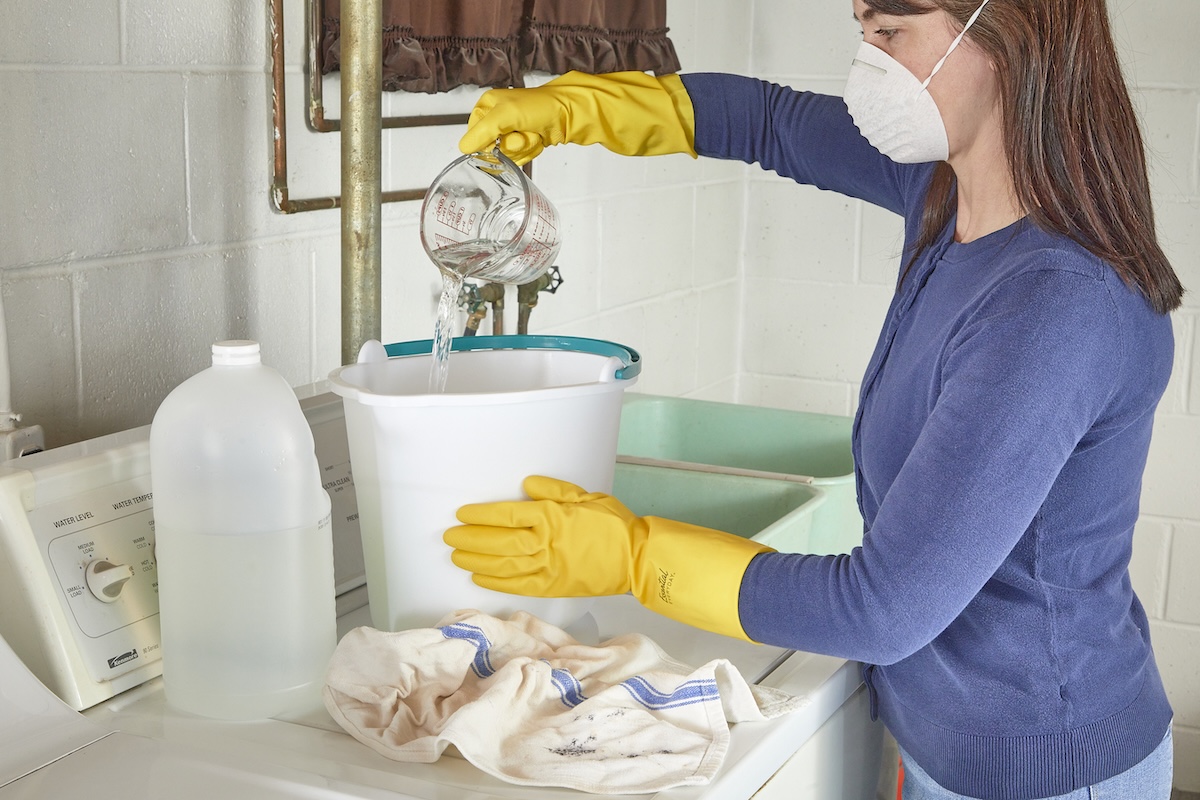

We may earn revenue from the products available on this page and participate in affiliate programs. Learn More ›
In the quest for a cleaner, greener laundry routine, one household staple can make a remarkable difference: vinegar. With growing awareness about the harsh chemicals in traditional laundry products, many are turning to this pantry staple for a natural alternative. Vinegar, known for its mild acidity and deodorizing properties, offers a multitude of benefits for your laundry, from acting as a fabric softener to removing stubborn stains and odors.
But how do you incorporate vinegar into your laundry routine effectively? Understanding how to use vinegar in laundry can transform your washing routine, making it more sustainable, cost-effective, and gentle on fabrics.
The Best Type of Vinegar for Laundry
To use this pantry staple to get your clothes clean, you’ll want to choose the right type of vinegar for the task. While it may seem counterintuitive, avoid using products labeled as “cleaning vinegar” for laundry because they have a higher acid content and can bleach clothing or even damage your washing machine. Standard distilled white vinegar is the best option, and it’s also an affordable solution that you likely already have on hand at home.
DO pretreat clothes with vinegar to remove stains.

Pretreating clothes with laundry vinegar helps lift stains and break down odors. Karina Toner, operations manager for Washington, D.C.,-based Spekless Cleaning, says, “Combine vinegar with laundry detergent to create a paste for pre-treating tough stains.” She recommends gently rubbing the mixture directly onto the stain before laundering for an extra stain-fighting boost, allowing it to sit for at least 30 minutes. This method is particularly effective for low-pH stains like coffee, tea, and wine. Vinegar’s acidic nature breaks down the organic compounds in these stains, making them easier to wash away.
DO use vinegar as an alternative to fabric softener.
Using vinegar as fabric softener is an all-natural and effective choice. Renowned for its softening qualities, vinegar works wonders on fabrics. Toner explains, “Vinegar serves as an excellent natural fabric softener. Add half a cup of white distilled vinegar to the rinse cycle to soften fabrics, reduce static, and enhance the freshness of your laundry.” This simple switch not only softens clothes but also combats static cling and infuses a fresh, clean scent.
Taylor Robertson, brand manager at Heritage Park Laundry Essentials, says temperature matters, explaining that “vinegar works best in conjunction with warm water, enhancing its cleaning and softening abilities.”
DON’T use vinegar on elastic clothing.
While vinegar may seem like a miracle when it comes to laundry, it’s not suitable for all fabrics. Avoid adding vinegar to laundry containing elasticized clothing. The acid in vinegar can break down the elasticity in these materials, leading to a degradation of the piece’s shape and fit. Garments like yoga pants, swimsuits, and some lingerie, where elasticity is key, should be omitted from vinegar treatments.
DO use vinegar to remove mold, mildew, and odors from fabric.

If you’re struggling with musty-smelling towels, vinegar can be your go-to solution for creating a laundry odor remover. Vinegar’s acidic nature makes it an excellent choice for removing mold, mildew, and odors from fabrics. Toner calls vinegar a “powerful odor eliminator” and says to “add half a cup to the wash cycle to neutralize unpleasant smells.” This method will leave your towels and other laundry smelling fresh and clean without any lingering vinegar scent.
Robertson recommends incorporating vinegar into your regular laundry routine. “Using vinegar every few washes prevents buildup from forming, rather than trying to remove it after it has already built up,” she says. This method not only tackles unpleasant smells but also helps prevent them from recurring. She does say, however, that “while vinegar is effective for removing buildup, it’s not a disinfectant. For sanitizing towels, especially during illness, you may need to use other methods in addition to vinegar.
RELATED: 29 Handy Household Uses for Vinegar
DON’T mix vinegar with bleach, baking soda, or ammonia.
When using white vinegar in laundry, it’s crucial to understand the chemistry involved to avoid potentially dangerous reactions. One of the most important rules is to never mix vinegar with bleach, baking soda, or ammonia.
Mixing bleach and vinegar creates chlorine gas, a toxic chemical that can be harmful to your respiratory system. It’s a dangerous mix that can cause coughing, breathing problems, and even burning sensations in the eyes, nose, and throat. Robertson says, “If you use bleach in your wash for white towels, do not use vinegar in the same cycle.”
While mixing vinegar with baking soda isn’t toxic, it does neutralize the cleaning properties of each. Baking soda is a base, while vinegar is an acid. When they combine, they create carbon dioxide, water, and sodium acetate, losing their individual cleaning benefits. It’s best to use them separately to leverage each agent’s specific cleaning properties.
Combining vinegar with ammonia can create complex chemical compounds that are not only ineffective as cleaners, but can also leave behind residues that can irritate the skin. Additionally, the combination can release odorous and potentially harmful gasses.
DO clean your washing machine with vinegar.
Vinegar isn’t just for clothes—it also makes a great cleaner for your washing machine. Over time, washing machines can develop a buildup of detergent, fabric softener, and other residues. Toner says, “In hard water areas, vinegar helps prevent limescale buildup in your washing machine.” She says, “Run an empty cycle with a cup of vinegar to keep your machine running smoothly.” It’s an easy and cost-effective way to maintain your appliance and improve its performance.
Final Thoughts
Incorporating vinegar into your laundry routine is a simple yet effective way to tackle various laundry challenges. From removing stubborn stains to ensuring a fresh, clean washing machine, laundering clothes with vinegar is a versatile and eco-friendly solution. This tried-and-true method not only elevates your laundry game, but also contributes to a more sustainable lifestyle.
